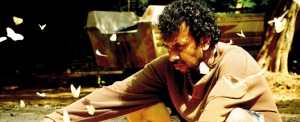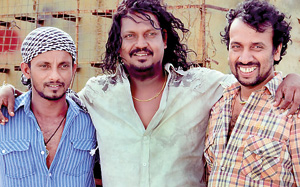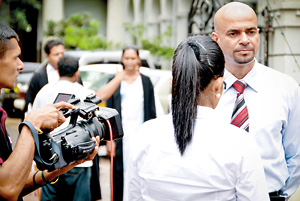The tale of a gun
 Nilendra Deshapriya talks about his directorial debut, Thanha Rathi Ranga -Between yesterday and tomorrow, that is being screened in local theatres following recognition at international festivals and screenings
Nilendra Deshapriya talks about his directorial debut, Thanha Rathi Ranga -Between yesterday and tomorrow, that is being screened in local theatres following recognition at international festivals and screenings
Nilendra Deshapriya walked into a cinema one Saturday and sat at the back, drawing as little attention to himself as possible. This is his film on screen, the one he has dreamt of since he was a young man, yet every time he watches it he can find another story within. Thanha Rathi Ranga-Between yesterday and tomorrow, still captures its director’s imagination, months after he has made the final cut and tentatively released it to the public.
 The script was written just after the end of Sri Lanka’s war in 2009 by two actors; Sarath Kothalawala and Kumara Thirimadura. Those familiar with local cinema will recognise Kothalawala from Ammawarune and Thirimadura from Ira Handa Yata, although they are perhaps more known for their work in television and onstage. “I fell in love with their script the moment I read it,” says Deshapriya simply.
The script was written just after the end of Sri Lanka’s war in 2009 by two actors; Sarath Kothalawala and Kumara Thirimadura. Those familiar with local cinema will recognise Kothalawala from Ammawarune and Thirimadura from Ira Handa Yata, although they are perhaps more known for their work in television and onstage. “I fell in love with their script the moment I read it,” says Deshapriya simply.
It is a tale that has been told many times but perhaps never in this way. The story unfolds in the jubilant background of Gunasinghepura just after the end of the conflict in 2009. Flags are brandished, kiribath is devoured and there is dancing on the streets of the community and three friends-Suraj, Wimal and Sirithunga-are so carried away by the excitement of it all that they decide to take a road trip up to the newly opened north. There, they literally stumble upon one of the most potent reminders of a land once ravaged-a gun, buried beneath the white beaches of Chalai.
This is Deshapriya’s debut as director, although he has served as First Assistant Director on several other productions. He will be more recognised at present for his work in television, however. He was instrumental in launching the Sirasa channel with Maharaja in 1998, later introducing the format of reality television to Sri Lanka with Sirasa Super Star, and then Obada Lakshapathi Mamada Lakshapathi (a localised franchise of Who Wants to be a Millionaire?). Having worked with Sirasa as Channel Head and Creative Head, he moved over to TV Derana in 2011 as Director and Head of the Channel.

On location: Adamaly who plays the role of a TID Officer
“I have always known what I wanted to do in life,” he says. As a seven-year-old, Deshapriya had his first taste of the cinema when he was dragged, “practically kicking and screaming”, to a film hall by his grandmother to watch Ten Commandments. “I remember there were a lot of kids making a noise, and then suddenly the bell rang, the lights dimmed and there was pin drop silence in the hall.” He was immediately captured by the power wielded by a director holding an audience spellbound. “I wanted that.”
From that point onwards he was relentless in his pursuit of screen magic. At 14 he wrote his first play; The Horse Carriage, inspired by Akira Kurosawa’s Rashoman. From the age of 17 onwards he began working with film directors as Assistant Director, travelling all over the country making films like Rejina, Keli Madala and Guru Gedara. Weekday evenings and weekends were spent at places like the British Council and Alliance Française, squeezing in as many film screenings as possible.
Thanha Rathi Ranga is his debut feature length outing as director, although it’s not the first attempt. In the 90’s Deshapriya was hoping to shoot They Dance Alone, a film about journalist and actor Richard de Zoysa who was killed during the troubled times of the 80’s. Time was working against Deshapriya then-he had other commitments in television and had to abandon the project. When Thanha Rathi Ranga fell into his hands he knew the opportunity had presented itself; “the time felt right, and I had found this script I was instantly moved by.”
The cast of Thanha Rathi Ranga come from all walks of local cinema, television and theatre. There’s Sarath Kothalawala and Kumara Thirimadura, who penned the script and also bring to life father of three Sirithunga and three-wheeler driver Wimal. Namal Jayasinghe, a talented young face from the silver screen taking on the melancholy of university student Suraj; Sulochana Weerasinghe, playing one of the few female leads as Jacintha, Wimal’s love interest; Kamal Addararachchi embodying the brutality of the neighbourhood gangster, Neeta Fernando and Anoja Weerasinghe playing mothers protecting their brood; Mohamed Adamaly as a quietly authoritative TID officer; and Swarna Mallawarachchi as Suraj’s mother.
The cast spent three months doing nothing but workshops, not knowing which role they’d take on. Over that period they filled a file’s worth of details about an assigned character, deciding things as minute as what their perfume would be. Once the roles had been assigned, scenes were blocked out in rehearsal rooms and on set was a matter of a dry run and then shooting the scene. Extras, background cast and walk-on parts were spontaneously chosen on location.

Nilendra Deshapriya
The film is being screened in local theatres following recognition at international festivals and screenings. It won Best Film at Dada Saheb Phalke International Film Festival (2014) in India and at I Will Tell International Film Festival (2014) in the UK. It was also nominated for Best Film at the Long Beach Indie International Film Festival 2014 in the US and for a NETPAC Award at the Bengaluru International Film Festival in India, in addition to being screened at several other film festivals around the world.
The director is happy, but says what he really wants is for the Sri Lankan audience to watch his film. The tale of a gun that is stumbled upon, literally, and passed on from hand to hand wreaking havoc until it eventually causes irreparable damage is a familiar one to his local audience. “What are the consequences of one bullet?” he asks, as does his film. “How many bullets have we had over the last 30 years? What have we become immune to as a nation?”
The film was shot in many different locations; starting in Gunasinghepura, it moves on to locations like Anuradhapura, Pooneryn and Alimankada. For Wimal, Suraj and Sirithunga, the journey is a migration from reality to a few days respite from the humdrum of their daily lives. For the director, it signified an important turning point of his life, moving from the air conditioned comforts of his offices to the stark, arid landscapes filming took them to. He will go back to television because that is his bread and butter, he says, but he now knows what he wants to devote the lion’s share of his time to. For in cinema and perhaps with Thanha Rathi Ranga too, Deshapriya has found his calling in life, a title he laughingly refers to as “a thief of hearts”.
Seminar on ‘Thanha Rathi Ranga’
A public seminar on Nilendra Deshapriya’s ‘Thanha Rathi Ranga’ will be held today, November 30 at 4.30 p.m. at the Sri Lanka Foundation Institute under the theme “Post- Prabakaran, amid historical anecdotes”.
Speakers at the seminar organised by “The Manifesto for Cultural Freedom’ will be Prof. Hinduma Sunil Senevi, Nihal Pieris, Vidharshana Kannangara, Ajith Galappaththi, Sandya Salgadu, Krishyantha Frederick, Mohan Hettiarachchi, Prabath Hemantha, Nadeeka Bandara, Udul Premaratne, K. Sanjeewa and Chamila Priyankara. The discussion will be hosted by Kushan Gayathra.


